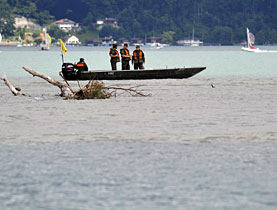
Shortcomings revealed by army accident report

The rafting accident which claimed the lives of five soldiers earlier this month was poorly planned and the troops involved lacked the relevant experience.
These were among the findings of the investigation carried out by the military justice authorities into the accident on the River Kander in the Bernese Oberland, which were released on Friday.
It was announced on the same day that the search for the body of the soldier who is still missing is being called off.
The report of the investigation said that no detailed reconnaissance of the river had apparently been carried out beforehand, and that no provision had been made for any rescue service to be on stand-by.
The definitive decision to make the trip was taken only on the morning of June 12, the day of the accident.
The survivors, who were all interviewed in the framework of the official investigation, made contradictory statements about whether they had been ordered to take part or whether the exercise was voluntary. However, the investigation established that it had taken place during the hours when they were on duty.
None of the survivors had had any civilian training in river rafting. The commander who organised the fatal trip said he had received training in handling the type of army dinghy used.
It is still unclear whether any superiors had been informed of the exercise, or whether they should have been.
In the accident two rubber dinghies capsized while attempting to cross the weirs on the river. Five men were drowned while the remaining five – including the company commander – were injured.
Only four bodies have so far been recovered.
Search abandoned
In announcing that the search for the fifth body is being stepped down, the defence ministry said it will be resumed at the end of the summer or in early autumn when the snow has stopped melting and the river level drops.
Although the 100 or so troops and lake police so far involved in the round-the-clock operation will stand down, the lake police will increase their surveillance of the search area over the summer and the military police will also keep an eye out when patrolling.
The later stages of the search have been concentrating on the Kander delta where the river flows into Lake Thun.
Role of the army
Meanwhile Defence Minister Samuel Schmid said on Friday that risks in the army had to be reduced to an absolute minimum.
“In the space of less than one year we have had to deal with an unimaginable tragedy, on the Jungfrau and now on the Kander,” he told high-ranking officers and civilians of the defence ministry.
Speaking at the first such meeting since army chief Roland Nef took up his position six months ago, Schmid praised the new commander for the decisive way he had acted in the wake of the latest tragedy.
“Of course we must speak about errors and mistakes,” Schmid said, but pointed out that the army was fulfilling an important role. It had contributed to the success of the Euro2008 football matches hosted in Switzerland, he said, and also plays a valuable part in guarding embassies.
Nef said he had been deeply shocked by the accident on the Kander, and had taken measures to try to prevent anything similar happening again.
Exercises and training should have a direct connection with the troops’ core task, and risks must be carefully weighed up taking a range of factors into account, including the exercise of common sense, he said.
Both Schmid and Nef declared their strong support for the Swiss militia army system. Under this system all male citizens are expected to undergo military training and perform a certain number of days of military service during their lives and even most of the officers are non-professional.
The meeting opened with a minute of silence for the victims of the Kander accident.
swissinfo with agencies
June 12, 2008: five soldiers die in rafting accident on Kander in Bernese Oberland, and five are injured.
July 12, 2007: six recruits die in an avalanche on the Jungfrau in the Bernese Oberland, the worst accident in 15 years for the armed forces.
October 12, 2001: an Alouette III helicopter hits a cable near Crans-Montana in canton Valais and crashes, killing all four people on board.
May 25, 2001: an Alouette III helicopter hits a cable near Delémont in canton Jura, killing the pilot and three border guards.
November 12, 1997: a Pilatus Turbo-Porter aircraft crashes during an exercise near Simmental in canton Bern. The pilot and four passengers die.
June 22, 1994: a civilian helicopter collides with a Swiss army Super Puma helicopter and crashes. A British couple and the pilot are killed.
April 27,1993: an army Pilatus Porter is caught up in high winds and flies into a cliff on the Finsteraarhorn in canton Bern. Three people die.
November 2, 1992: six people die when a munitions depot blows up near Susten in canton Bern.

In compliance with the JTI standards
More: SWI swissinfo.ch certified by the Journalism Trust Initiative




























You can find an overview of ongoing debates with our journalists here . Please join us!
If you want to start a conversation about a topic raised in this article or want to report factual errors, email us at english@swissinfo.ch.